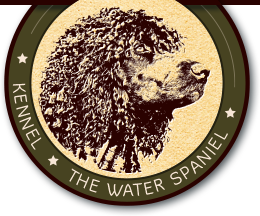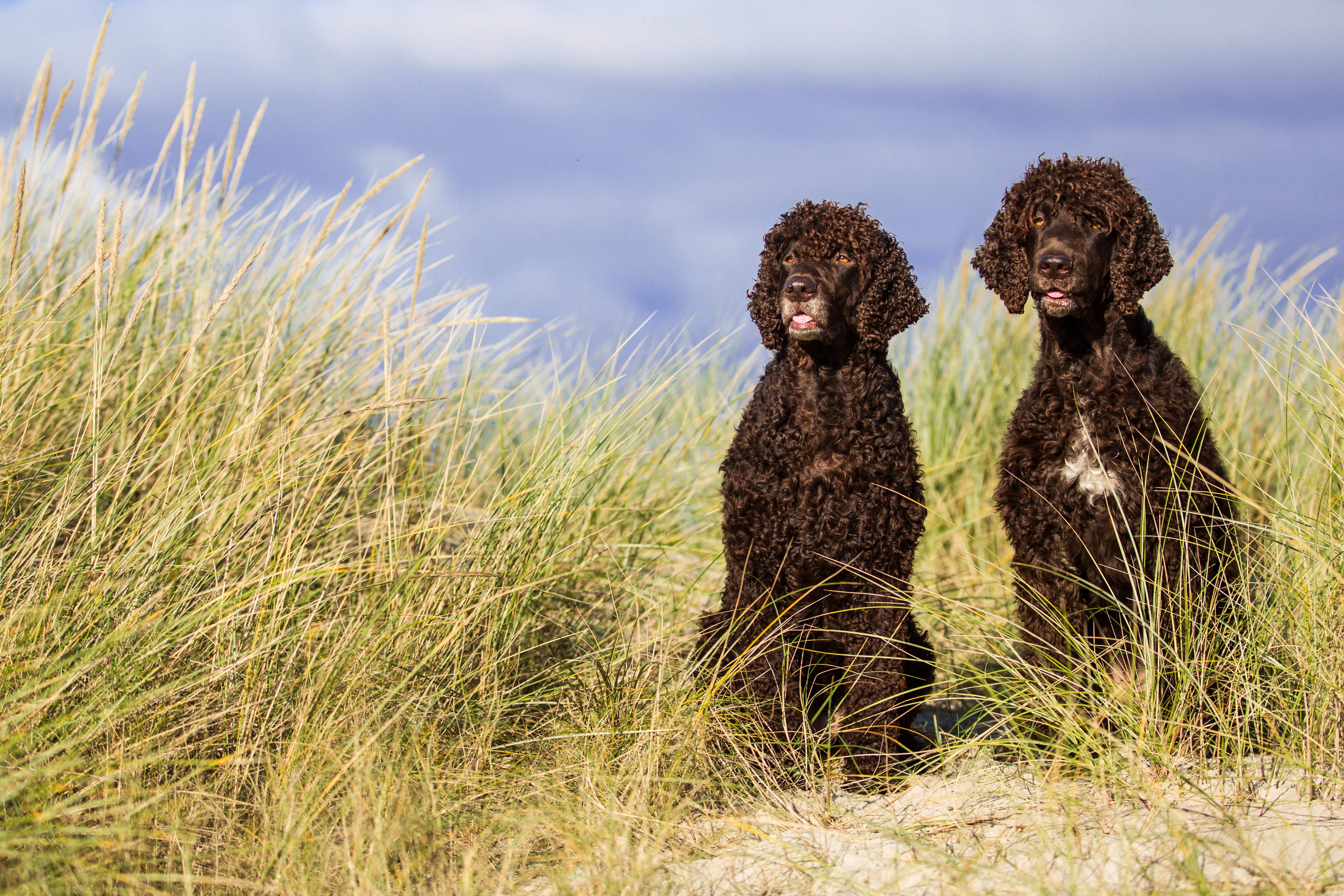Is an IWS the right dog for YOU?
Originally bred as a wildfowling dog to work on the marshes, bogs and rivers of its’ native Ireland it is a versatile gundog.
Looks
The Irish Water Spaniel is the tallest of all the spaniels and is a medium, strongly built dog with a distinct characteristic appearance. They are compact, well-boned with a pronounced barrel rib-cage. The coat should be a deep rich liver colour composed of tight crisp curls and ringlets. The face, throat and tail should be smooth and the head topped with a characteristic ‘top knot’ growing in a well defined peak between the eyes.
Character/Temperament
Irish Water Spaniels are slow to mature and can be headstrong and wilful. They are also intelligent, alert, mischievious and fun loving, in fact they are widely known as the ‘clown of the spaniel family’. It is their intelligence that gives the IWS a reputation as a comedian as they are inquisitive and often use their own initiative in ways that can surprise, delight or frustrate their owners.
They do have an endearing nature but require early training and socializing to ensure their manageability. They learn very quickly but, can also become bored and stubborn if overtrained. They need variety to keep them interested.
The main reason for rehoming an IWS is because of a lack of early consistent training. They are therefore not the best breed for the first time dog owner.
Exercise
The Irish Water Spaniel is an active breed requiring regular exercise, preferably free running. They also enjoy swimming and retrieving games. Most IWS love any water be it muddy, smelly or clean- so be prepared to get wet. Maybe not one for the houseproud!
IWS can take part in many activities and enjoy agility and obedience if they are in the mood!
IWS have great noses and have been used both as drug detector and explosives dogs.
Whilst a good sized garden would be an advantage as long as the dog is given adequate physical and mental exercise this is not an absolute requirement.
Feeding
Many IWS are quite greedy and can be prone to put on weight so food intake needs to be monitored carefully as they need a surprisingly small amount of food for their size.
Grooming
As a coated breed they do need regular grooming and trimming. A thorough brush and comb through is required at least once a week. Their coats also collect burrs, brambles and grass seeds so need to be checked daily, especially the feet and ears. To keep them tidy a cut down could be done once a year. If you cannot do this yourself you will need to find a groomer who can and the cost of this needs to be taken into account when choosing a coated breed.
Considerably more grooming will be required if you wish to put your dog in the show ring . The advantage of the IWS coat is that it does not shed- much!
Because of this they are often recommended for people with allergies.
However they are not always suitable and you would be advised to spend some time in the home of someone with several dogs to test your reaction before considering the breed.
Average Lifespan
8-12 years
Health
As a larger breed the IWS can be susceptible to hip dysplasia. All parents of puppies should be hip scored.
Is it the breed for you?
If you are prepared to spend the time socializing, training and giving them the mental and physical exercise needed and are prepared to look after the coat then you will be rewarded with a great companion to share your life with.
They are certainly not an easy option but they are great fun!
If you are interested in the breed we recommend you go and meet an IWS in your area.
Buying a Puppy
It is important before buying a puppy to think about the level of activity of the puppy and the dog it will become and whether you have the time to devote to its needs.
Can I see the puppies with their mum?
The puppies should be seen at home with their mum.
How old is the mum?
Mum should be at least two years of age.
How many litters has mum had?
In my opinion 4 litters are absolute maximum for a bitch. The less, the best !
What health checks do Irish Water Spaniel breeders do?
The Irish Water Spaniel doesn’t have any breed specific health issues. It is advised that all dogs are hip scored before breeding.
Have both mum and dad been hip scored? What are their scores?
Hip scoring is a measure of the degree of hip dysplasia.
Each hip is x-rayed and scored and there are different score systems in the world. England addes the two scores together. The scores can range from 0-53 for each hip 0 being perfect and 53 the being the worse. The average hip score for Irish Water Spaniels is 17.
What should I feed the puppy and do you have a diet sheet?
The puppies will become special food by your breeder and you should not change it in the beginning. Otherwise you will risk a diarrhoea. You can change the food later, but this should take place at a longer period of time with progressively raising amount of the new type of food and gradually less of the old type of food.
Have the puppies been wormed?
Puppies should be wormed regularly so information should be given as to when the next dose of wormer is due.
Have the puppies had any vaccinations?
If yes, when and what vaccination was given? The vaccination record card should be given to you. If not, contact your own vet to discuss vaccination requirements.
Can I return the puppy if it has any health problems?
The breeder should take the puppy back at any time if there are any problems.
How much exercise should the puppy be given?
Advice should be given to ensure a young puppy is not given too much exercise which could result in joint damage.
What grooming does the puppy require?
Information sheet should be given. You may need to find a groomer to trim your dog if you cannot do it yourself. Puppies should be groomed regularly from the start so they get used to standing still and accepting combing.
Is the puppy kennel club registered?
Registration papers should be given to you or sent on as soon as possible.
Don’t forget to transfer the puppy’s ownership to your own.
Is the puppy microchipped?
If it is the details will need to be updated to your name and address. If not you may want to discuss microchipping with your vet.
Is the puppy insured?
Many breeders give 6 weeks free insurance with a puppy. It is worth shopping around to find the right insurance policy for you if you are going to continue insuring your puppy.
What the breeder should ask you ?
Be prepared for the breeder to ask you questions to try and assess your suitability as an owner. A good breeder will give you all the information you need to cope with your puppy and will always be willing to give you advice. A good breeder will also want you to agree to return the puppy to them at any time if you are unable to keep it for whatever reason.
You should find out as much about the breed as possible before deciding to have a puppy. Also look into puppy classes in your area, go along to a few to watch before you get your puppy to see if you like their methods. You may need to book a place in advance as puppy classes get filled up quickly.

